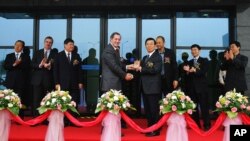China’s anti-corruption commission has begun an inquiry into a top official in the southwestern province of Sichuan, state media reported Wednesday. He's the most senior person to be investigated since Xi Jinping became Communist Party leader last month.
Li Chuncheng, Sichuan's deputy party chief, has not been seen in public since November 19 according to Xinhua, the official Chinese news agency. Li was promoted last month to be one of the 171 alternate members of the party's central committee. He had served in Sichuan since 1988.
Xinhua carried a report on Li that has since been removed from its website; Hong Kong media have also reported on the case. It is not clear what crime he may have committed.
The extent of official corruption has regularly featured among the complaints from foreign investors doing business in China, the world’s second-largest economy.
"China is playing an [increasingly] important role in the world economy. In the last decade, the Chinese government has begun to acknowledge that corruption is something they can not take abroad with them," said Robin Hodes, research director at Transparency International.
"Last year, the government implemented the criminalization of foreign bribery," she said. "In general, [officials] need to be more aware that how Chinese companies behave abroad is going to affect the country's role in the world and the sustainability of this tremendous growth in China."
Xi, who will become China's president in March, warned last month that if corruption was allowed to run wild, the Communist Party risked major unrest and the collapse of its rule. He appointed Wang Qishan, a vice premier known for his ability to push through changes, as his top graft fighter.
Hodes said Transparency's 2012 index on state corruption, which showed China slipping five places to number 80 of the 176 countries where perceptions of official graft were measured, is really an assessment of overall public sector performance in China and the perceived influence of bribery.
Li Chuncheng, Sichuan's deputy party chief, has not been seen in public since November 19 according to Xinhua, the official Chinese news agency. Li was promoted last month to be one of the 171 alternate members of the party's central committee. He had served in Sichuan since 1988.
Xinhua carried a report on Li that has since been removed from its website; Hong Kong media have also reported on the case. It is not clear what crime he may have committed.
The extent of official corruption has regularly featured among the complaints from foreign investors doing business in China, the world’s second-largest economy.
"China is playing an [increasingly] important role in the world economy. In the last decade, the Chinese government has begun to acknowledge that corruption is something they can not take abroad with them," said Robin Hodes, research director at Transparency International.
"Last year, the government implemented the criminalization of foreign bribery," she said. "In general, [officials] need to be more aware that how Chinese companies behave abroad is going to affect the country's role in the world and the sustainability of this tremendous growth in China."
Xi, who will become China's president in March, warned last month that if corruption was allowed to run wild, the Communist Party risked major unrest and the collapse of its rule. He appointed Wang Qishan, a vice premier known for his ability to push through changes, as his top graft fighter.
Hodes said Transparency's 2012 index on state corruption, which showed China slipping five places to number 80 of the 176 countries where perceptions of official graft were measured, is really an assessment of overall public sector performance in China and the perceived influence of bribery.





